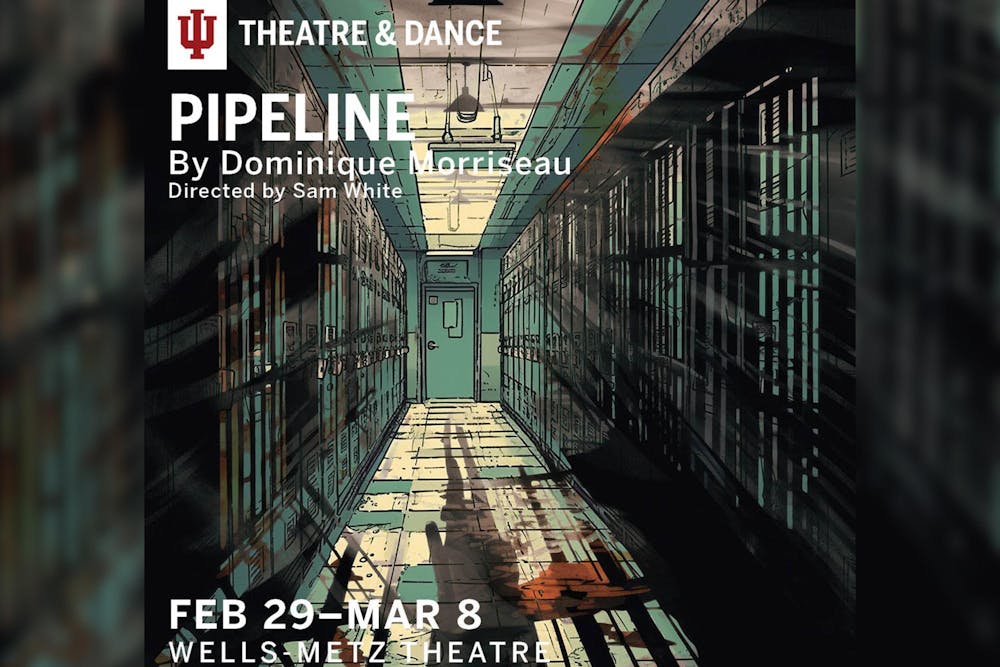The IU Department of Theatre, Drama, and Contemporary Dance performed “Pipeline,” a play by Dominique Morisseau at 2 p.m. and 7:30 p.m. Feb. 29-March 8 in the Wells-Metz Theatre. Morisseau has written numerous plays focusing on marginalized communities and the challenges they face. I was truly amazed by the performance, and how IU put up the play. The setting, acting and music were outstanding, and it echoed perfection.
“Pipeline” follows Nya, a Black mother as she struggles through life. The play begins after an incident where her son, Omari, faces expulsion after he pushes a teacher against a smartboard.
Through this, the play aims to portray racial inequality and lack of equity of the Black community within the educational system.
IU’s production truly pushes the main ideas through the immaculate performances of all the actors. Every scene took the audience on an emotional rollercoaster with the actors hitting the emotions on point and showcasing the frustrations of the characters to perfection.
IU graduate student Olivia Johnson embodied the role of Nya. From her stage positioning to vocal inflections and perfect emotive expressions, she was the star of the show. I particularly liked her body language throughout the play, including small but important details such as her leg shaking every time she was frustrated or anxious, clearly communicating her emotions.
As the play unfolds, Omari desperately tries to explain his side of the story and begs for a listening ear from his mother. He explains how his teacher continually picked on him in class. He did this by making comparisons between Omari and a Black character from the novel "Native Son,” in which the protagonist is referred to as an animal. This angered Omari, leading to his aggressive response to the teacher.
IU masters student Brian Alexander Davis played the role of Omari excellently. His performance oozed with emotion and honesty. Omari’s frustration and desperate attempt to convince his mother he was not in the wrong was portrayed perfectly throughout the play. His performance ensured every individual in the audience felt for Omari and furthermore, agreed with Omari’s reasons and saw a little bit of themselves in his character.
From the feelings of frustration Nya faces to the loneliness and loss of identity her son expresses, the play appeals to pathos and shares the realities of the racial inequality prevailing in the educational system.
My favorite element in IU’s production of “Pipeline” was the use of music by Black artists to transition from one scene to another. It is common in theater for the stage to be blacked out and accompanied by total silence as the scenes transition. However, in this production, complex graphics and music with strong lyrics were used during the transition. This helped keep the audience in their emotional state and ensured they remained captivated.
The closing scenes of the play where Nya finally understands her son led to the resolution of these feelings of frustration and loss of identity felt throughout the play. The final scene of the play is between Omari and Nya, where he explains to his mother that he is doing good, and that he has finally broken free from the reigns of society and society’s expectations and limitations. He creates his own set of rules, referring to it as his “scriptures”.
Omari takes freedom into his own hands, setting expectations and boundaries for himself to break free of society’s oppression and discrimination. The ending of the play did a spectacular job connecting these points by recognizing the subtle ways in which one’s freedom is bound to society and its boundaries.
“Pipeline” urges the audience to look within and ponder upon the complexities of racial inequality within the education system and outside, making the audience question their internal frustrations and encouraging them to “make their own rules.”
Pehal Aashish Kothari is a freshman studying marketing with a minor in merchandising.




